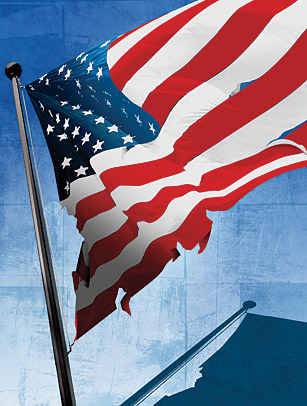
(2 of 2)
There are two ways of measuring American power and influence at a given point. If you measure them merely in terms of how much richer the U.S. is than the rest of the world, then 1945, when much of the rest of the world lay in ruins, would definitely be our heyday. At the end of World War II, the U.S. was responsible for a third of the world's manufacturing exports. And under that yardstick, the Marshall Plan, aimed at rehabilitating Europe's lost prowess, would have been a mistake, as it was bound to eat into U.S. global market share.
But a more appropriate measure of American influence and power is the combination of the country's wealth and its sway in the world. Back in 1941, Luce noted that "American jazz, Hollywood movies, American slang, American machines and patented products are in fact the only things that every community in the world, from Zanzibar to Hamburg, recognizes in common." He had no idea: at a time when there are as many people studying English in China (or playing basketball, for that matter) as there are people in the U.S., seven of the 10 most watched TV shows around the world are American, Avatar is the top-grossing film of all time in China, and the world is as fixated on U.S. brands as ever, which is why U.S. multinationals from McDonald's to Nike book more than half their revenue overseas. If you bring together teenagers from Nigeria, Sweden, South Korea and Argentina — to pick a random foursome — what binds these kids together in some kind of community is American culture: the music, the Hollywood fare, the electronic games, Google, American consumer brands. The only thing they will likely have in common that doesn't revolve around the U.S. is an interest in soccer. The fact that the rest of the world is becoming more like us — in ways good and bad — underscores the extent to which we are living in an American century, even as it erodes, by definition, the notion of American exceptionalism.
For all its egregious missteps around the world, the U.S. remains an inclusive superpower. Other nations are thriving under the Pax Americana, and the rise of second-tier powers makes the continued projection of U.S. might more welcome in certain neighborhoods. South Korea, Japan and even Vietnam appreciate having the U.S. serve as a counterweight to China; Pakistan and India want to engage Washington to counterbalance each other. According to last year's Pew Global Attitudes Survey, half the 24 nations questioned held a more favorable view of the U.S. than they did of China or Russia. (The most glaring exceptions, where Brand America has obvious problems for obvious reasons, were in the Middle East.)
The most credible argument for American decline has to do with our society's profligacy and dysfunctional governance. The nation's mounting debts, however, result as much from a lack of discipline as from a lack of resources. In a time when the country is supposedly stretched to its limits, for instance, wealthier Americans can still claim a mortgage-interest deduction on a vacation home. We fret about our dependence on foreign oil but only very recently considered building more nuclear plants. And let's not even get into entitlement reform or the lack thereof. Americans, in short, have forgotten how to do the hard stuff, let alone what it means to truly mobilize to confront a serious challenge as they did to fight World War II.
The country needs to find a way out of this political paralysis not only to retain its global leadership but also to exercise it. If it can be bothered, the U.S. commands enormous untapped capacity and wealth. Regardless of how sclerotic Washington is these days, the U.S. is still likely to innovate the next big thing, whether that be revolutionary life-extending medical technologies or new fuel-excreting life-forms that scientists are rushing to perfect at places like UCLA and Arizona State University. In terms of how we communicate and how we access and use information, bet on the looming showdown between Google and Apple to define this decade. And bet on the U.S. to be the nation that gives birth to the next Google.
As anyone raised in a different country will tell you, two of the strongest impressions someone has on arriving in the U.S. are 1) what a great country this seems to be, and 2) what a mess it must be, judging by the tenor of news coverage and political discourse. In most places, those two are reversed. Overwrought, constant hand-wringing about the nation's decline is one of America's competitive advantages, reflecting high standards and expectations — what Reinhold Niebuhr described as the hubris of a nation's "dreams of managing history." Americans have little tolerance for accidents or other calamities: we investigate, postmortemize and litigate bad stuff until it is clear who is to blame and why it won't happen again. Then we go on fretting about how the nation is falling apart. And that vigilance seems to immunize the country against that dreaded fate.
So stay anxious, and alarmed, about the fate of the country. That's the best way to ensure that this century, like its predecessor, will be an American one.
Martinez is the director of the Bernard L. Schwartz Fellows Program at the New America Foundation. All the authors in this section, with the exception of Charles Kenny, are affiliated with the New America Foundation